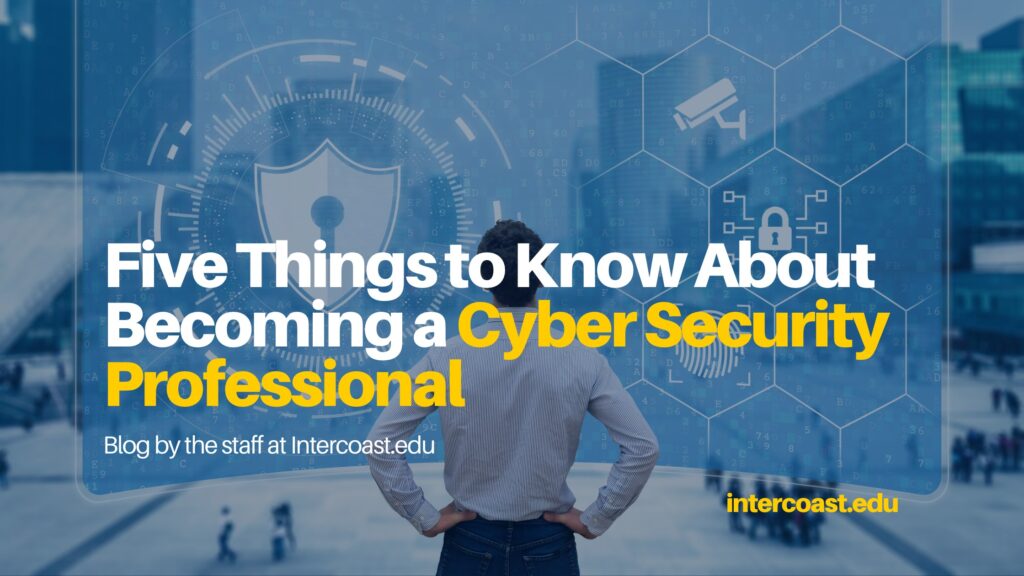According to CybersecurityVentures.com, between 2021 and 2025, global cybersecurity costs are expected to exceed $1.75 trillion. Companies in an increasingly digital world depend on cybersecurity professionals to protect their networks and data from hackers, malware, and other threats.
A cyber security certificate program may be a viable option if you’re looking for a way to enter the workforce. Cybersecurity is a great industry for go-getters, tech wizards, and people who are always willing to learn.
InterCoast College may be a good option if you’re considering a cybersecurity career. interCoast is proud to offer courses that can expand your knowledge of cyber security practices.
First, consider five things you should know about becoming a cybersecurity professional.
1. Cyber Security Is an Umbrella Term
When we talk about cyber security, we’re talking about a vast web of interrelated roles. While smaller companies may hire one cyber security or IT professional to keep their digital footprint safe, larger companies may rely on several professionals focusing on specific niches. Cyber security jobs can be broken up into categories, including:
- computer forensic analysis
- ethical hacking
- IT security
- security engineering
- security consulting
- security administration
- information security analysis
- machine learning engineering
You’ll likely start with the basics to break into a specific cybersecurity niche. A cyber security program like our AAS Degree program can lay the groundwork for theoretical knowledge you’ll need in your career. Once you’ve entered the workforce, you may discover niche work that speaks most to your interest and skill set.
2. There Are Many Paths to Cyber Security Jobs
Are you interested in cyber security but only have a high school diploma? People often assume that careers in cyber security require a Bachelor’s degree or higher just to get your foot in the door. The truth is that having a degree may be helpful, but there are other paths to entry-level cybersecurity jobs.
You must demonstrate two things as you continue to build a cybersecurity career: theoretical knowledge and experience—the former you can usually attain by enrolling in and completing courses in different cybersecurity practices. The latter will come from the jobs you secure and projects you complete.
In addition to our AAS Degree program in cyber security, InterCoast also offers a cyber security specialist course. This course can help you prepare for some certifications to show that you demonstrate specific cybersecurity knowledge, depending on the certification examination you choose to explore.
3. A Cyber Security Professional Is Always Learning
Technology constantly evolves, giving us the latest iPhone, the newest video game, and the most advanced machine learning. Unfortunately, that also means that cyber threats are also evolving at a surprisingly fast rate.
In 2022, cyber security professionals discovered over 30 million new malware samples. While cyber security professionals should do their best to be proactive, a lot of cyber security work requires them to be reactive.
To stay current with the latest trends and shifts, a cybersecurity professional must commit to learning regularly, even after graduating from a cybersecurity program or taking cybersecurity courses. If the idea of working in an industry that will constantly bring new challenges excites you, then you’re on the right path to pursuing a cybersecurity career.
4. Cyber Security Requires Soft Skills
We’ve talked a lot about the hard skills (e.g., theoretical knowledge and hands-on experience) you’ll need to build a career in cyber security. However, hard skills aren’t the only thing employers seek in cybersecurity professionals. It’s also useful to have soft skills like:
- time management
- clear communication
- emotional intelligence
- adaptability
- creativity
- Problem-solving
- Good judgment
- teamwork
Research shows an increasing soft skills gap in the STEM fields. While industries like cyber security may seem focused on isolated roles, many cyber security specialists work on teams and must be able to communicate, delegate, and manage project steps. Some cyber security specialists are even tasked with communicating project objectives or working with the public.
By cultivating soft skills, you can open your horizons to more cybersecurity jobs. A background in other non-technical industries or fields may also prove useful, allowing you to apply your cyber security skills to non-technical businesses.
5. Networking Is a Cyber Security Must
Another sign that cyber security and other IT jobs aren’t as isolated as they seem is the need for networking. Networking is building relationships with others in your field or related fields. Not only can this give you opportunities to deepen your knowledge of the latest industry trends, but it may even come in handy when trying to secure a job.
In addition to completing courses and working toward various certifications, consider attending cybersecurity conferences and other networking events. These events offer an opportunity to meet people that could open up new doors for you and foster beneficial relationships.
As we mentioned earlier, there are many paths to cyber security jobs. Networking adds more paths to entry-level roles that could start your cyber security career.
Broaden Your Cyber Security Knowledge With InterCoast
Does becoming a cyber security professional sound appealing to you? If so, you don’t have to put everything on hold while you pursue a four-year degree. There may be other pathways into the cyber security industry, and InterCoast staff is available to discuss those various pathways with you.
Are you interested in our AAS Degree program or cyber security specialist course? If so, feel free to learn more about the knowledge you can gain from InterCoast.
InterCoast Colleges is accredited by the Accrediting Council for Continuing Education and Training (ACCET). InterCoast Colleges has been accredited by ACCET since 1988.
